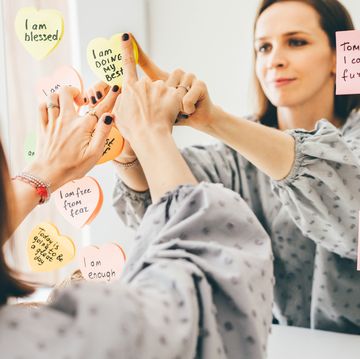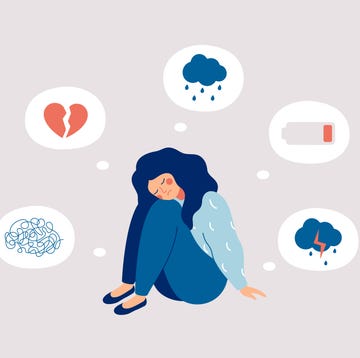If you've ever asked yourself, "Why do I cry so much?" you're definitely not alone. Whether it's over a breakup, a disappointing review at work, or the loss of a loved one, shedding a tear or two is a normal aspect of life. "Crying is an excellent way of releasing emotions and processing difficult situations," Dr. Gail Saltz, associate professor of psychiatry at the NY Presbyterian Hospital Weill-Cornell School of Medicine, tells Woman's Day. Though crying helps you process your emotions, not everyone copes the same way, and you may be wondering why some people cry so easily while others don't.
During these unprecedented times, you might find yourself crying more than you ever did before, and that doesn't necessarily reflect a change in personality or neuroscience, simply circumstances. "Stress from COVID comes in various ways: social isolation, fear of exposure, loss of loved ones, burdens of childcare/home schooling, and financial pressures," Dr. Pamela Rutledge, psychologist and director of the Media Psychology Research Center, tells Woman's Day. "Stress causes fatigue, which diminishes our ability to self-regulate. This makes us more vulnerable to emotional exhaustion which can also make us quicker to cry."
COVID-19 anxiety aside, if you begin to feel like you don't have control over your emotions, it can signify something more going on with your body and/or mind.
Here, experts break down some of the psychology behind constant crying.
1. Built-Up Emotions
Sometimes, when you have a lot going on, it can be difficult to properly process your feelings about certain things that have taken a toll on you emotionally, causing your emotions to subconsciously build up and spill over suddenly and unendingly. "If you find that you are spontaneously weeping, take some time to practice self-care— mindfulness, relaxation, or a hot bath — or reach out to [a] psychologist or therapist to get some professional support," if it persists, Dr. Rutledge says.
2. Emotional Empathy
If you've recently started spending a lot of time with people who are emotional and cry more often than you typically do, you may find yourself subconsciously following suit. "Thanks to mirror neurons, the same areas of the brain are activated when we see someone reacting emotionally as when we are emotionally aroused," Dr. Rutledge says. You also may just be more emotionally empathetic to the feelings of others, which can result in more crying.
3. Learned Associations
Throughout life, learned experiences become learned associations, says licensed clinical psychologist Dr. Kevin Chapman, Ph.D. If you associate certain moments, songs, movies, etc. with sadness or crying, then your body registers that, making you more likely to cry during those things. "An example would include crying during any Hallmark movie due to the expectation (or the learned association) that 'I always cry' when watching a movie that triggers sadness," Dr. Chapman tells Woman's Day.
4. Neuroticism
Neuroticism is a temperament factor that is associated with emotional disorders and basically means someone experiences core emotions more frequently and intensely than others, Dr. Chapman explains. "Many individuals who are high in neuroticism become hypersensitive to situations that trigger strong emotions, such as sadness," he adds. In other words, those who have high neuroticism feel emotions very deeply, resulting in them crying more often.
5. Depression
Depression is a mood disorder marked by persistent feelings of sadness or numbness that can lead to unusual crying. "If you've had a change in how much you're crying and it's consistent with your mood, then you should think about depression," says Dr. Saltz says. She adds that signs of depression include feelings of sadness, hopelessness, or emptiness, a loss of interest, sleep disturbances, and fatigue.
6. Anxiety
With an anxiety disorder comes excessive worrying, irritability, difficulty concentrating, and … tears. According to the Anxiety and Depression Association of America, anxiety disorders are the most common mental health illness in the U.S., affecting over 18% of the population. If you suspect that you're experiencing excess feelings of anxiety, consult with a professional, who may recommend therapy, medication, complementary medicine, or lifestyle changes.
7. Early Trauma
According to Dr. Kate Cummins, Psy.D., women who had a traumatic childhood or have experienced extreme traumatic events will often cry more than what is considered a normalized response: "This is because their sympathetic nervous system experiences trauma or anxiety in the same somatic responsive way, regardless of the scale of how traumatic the event actually is," Dr. Cummins says.
8. Stress
According to Dr. Sharon Saline, the effort it may take you to ward off sadness, anxiety, bad news, or something that disturbs you could be compromised when you're stressed. "When the body is dealing with these strong feelings, the feeling brain takes over the thinking brain and rules the day, allowing tears to flow more readily," Dr. Saline says. Stress also increases levels of cortisol, which Dr. Saltz says can increase hypersensitivity and reactivity to a challenging or stressful situation.
9. Personality
Everyone has his or her own unique personality, which is your collection of behaviors, traits, and cognitions. Biological differences in brain structure and physiology can impact your personality and emotional sensitivity, which could lead to more tears. According to Dr. Forrest Talley, Ph.D., neuroscientists aren't exactly sure the neuroanatomy behind crying, but they know it involves the limbic system: "Just as people who are more anxious have differences in sensitivity of their amygdala, so too differences in crying are linked to genetic differences in sensitivity of the limbic system."
And some people just have more sensitive personalities than others. According to Dr. Elaine Aron, Ph.D., about 15 to 20% of the population has this personality trait. "A highly sensitive person is more sensitive to their surroundings, to other people's feelings, the good, and the bad of that," Dr. Saltz says. "They're more affected by the attitudes and comments of others."
10. Hormones
Hormones are the chemical messengers that control bodily functions like hunger, reproduction, emotions, and mood. "Anything that causes a shift in hormones, like premenstrual time, postpartum, or menopause, may cause women to cry more easily," Dr. Saltz says. According to Saltz, you'll be able to tell if your hormones are shifting, because it's a sudden onset.
11. Socialization
According to Dr. Cummins, women generally experience their feelings in a greater capacity than men: "Women are socialized to explore, talk about, and show their feelings from a young age more than men. This means that crying, a typical expression of sadness, grief, or vulnerability is more familiar to them." Cultural norms make it tougher for the men to express their emotions. "I see many boys in middle and high school who fight back tears, while girls of the same age will openly cry," she adds.
12. PseudoBulbar affect
PseudoBulbar affect (PBA) is a neurological condition that affects your emotions after a traumatic brain injury or disturbance to the part of the brain that controls emotion. "If you didn't used to be a crier, but are having crying fits, uncontrollable laughter, or anger that are not consistent with your mood, then it could be PseudoBulbar affect," Dr. Saltz says. "It can be due to any number of brain injury situations, like a stroke, organic injury, dementia, and more." She says it's extremely rare, but it's important to watch out for signs of it, which includes fits of crying.
Subscribe to Woman's Day today and get 73% off your first 12 issues. And while you’re at it, sign up for our FREE newsletter for even more of the Woman's Day content you want.

Nicol is a freelance Editorial Assistant at WomansDay.com and is a Manhattan-based journalist who specializes in health, wellness, beauty, fashion, business, and lifestyle. When Nicol isn't writing, she loves spending time with family and friends, trying new workout classes, and traveling.



















